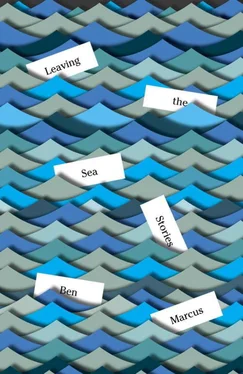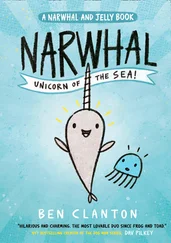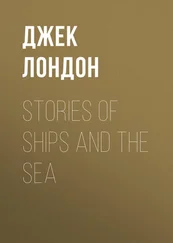“Well, we see something sometimes,” the doctor was saying, “in this kind of white blood person. The scan is really. This is why we scan. And,” the doctor continued, “we have this discovery to show you.”
The doctor pointed his pen at a scuff in the film.
“A little discovery. You can discover it here.”
The doctor traced the outline of nothing that was, perhaps, a shade lighter than the nothing around it.
Maybe Julian could see it. A very small shape, like a cloud. In his brain . Weather passing through. If you could draw a headache, this is what you would draw.
“This is a concern,” said the doctor, looking at Julian hopefully.
“Okay,” said Julian. “Where is it?”
That mattered, right? His entire personality could be explained by this cloud. A cluster of rogue cells pushes on a nerve, blocks a vessel supplying blood to the deep limbic system, and suddenly you’re funny, witty, and charming. That’s what a personality was, the blood thirst of rogue cells, a growth in the mind.
The doctor pointed again at the cloud.
“It is here,” he said, more slowly.
“No, I mean in me . Where is this thing?”
Julian tapped his head. Maybe it wasn’t in the brain itself.
“This is not our work.”
“You didn’t make this tumor?” Julian grinned.
“Well, tumor,” the doctor said, as if there might be some doubt. “We see a shape, yes? We do not make that name for it. We do not work on this kind of area? We do not fix this.”
“Does anyone?”
“Someone who must know what this is. Who treats the brain where you live.”
Yes, someone must.
“We will be sending this scan to your American doctor. And we think that the stem cell transfusions is not, for now, a good idea. Until this.”
The doctor pointed at the cloud and tried, again, to look stumped.
“This first. To understand this. Then, maybe.”
Julian was impressed. The doctor had devised a pretty good tombstone.
This first. To understand this. Then, maybe.
Julian laughed.
“What is it?” asked the doctor. As in, thank God this moron is going into denial now. He’s going to be one of those people who cracks jokes after getting news of a tumor. I will not need to wash his tears from my doctor’s coat.
“It’s just that, if you tell me it’s all in my head now,” said Julian, “you won’t be lying.”
“Aha. I see what you say. This is truly funny. But we will not be lying to you ever, Mr. Bledstein.”
Oh, feel free, Julian didn’t say. Lie to me all you want.
The nurse brought in the papers to terminate his treatment, seal off liability, severing connections between Julian and the clinic. He signed and signed and signed. His writing surprised him, his ability to do it. It wasn’t a language-blocking cloud, but, then, what was it blocking? What was it allowing? And how long had it been there?
The doctor, frowning thoughtfully, trying to make conversation, stood by.
“I am sorry we do not have a way to give you your money back,” the doctor was saying.
“I could help you,” Julian said, “if you want.”
“Excuse me?”
“I could show you a way to give me my money back,” explained Julian. “You know, how to transfer it back to my credit card. It’s not so hard.”
“Oh, you must misunderstand.” The doctor blushed.
“Yes, I must,” said Julian.
Outside the clinic, standing on the plaza steps in her long corduroy thrift store coat, nearly hidden by a plaid scarf, was Hayley. She gave him a shy little wave, sheepishly smiling, forgiving, forgetting, denying, all in one cute fucking face. How on earth?
“Jules! Oh my God, you took forever !”
“I took forever?” He tried to sound arch. Here his Hayley actually was . Jesus Christ.
“It’s freezing here.” She laughed.
She had a gift for killing off oddity, making shit like this—sudden encounters in foreign countries—seem routine.
Julian agreed that it was cold. Germany in February and all that. But he stood his ground. Specimen Hayley, trying to make good. How interesting. He’d see where this led. He probably had cancer.
“Are you okay?” she asked. “You look good.”
How nice if that were true. He’d never looked good, even as a baby. Even before he was a baby, when he was just somebody’s fear. Once he was only dread in the pit of his mother’s stomach. He was born sick, conceived by his parents as their sick little boy. Was there a sexual position favored by his parents’ generation that guaranteed they’d birth a forceless runt, someone who would desperately need their help his whole life? Hayley should be ashamed of herself. He looked good . Still, he had to applaud her strategy. Cheer, denial, exuberance. If only he could. Tombstone.
“Come here already!” Hayley shouted. “Come hug me, you stupid bastard. How are you? Oh my God, I can’t believe I’m seeing you.”
He succumbed to Hayley’s hug, giving little back. Whatever he had done, or not done, to himself, not just over the last two weeks, but over the years, too, had rendered him immune right now to the pleasures of her small body wrapped up in his, to her breath, to the way her hair got on his face. Even the warm kiss she gave. Immune, indifferent, cold. Once it had been his choice to resist these overtures. He used to watch himself taking the low road, hogging the lane, during Hayley’s flirtations with forgiveness. But no longer. It was like being hugged by a machine. He held his breath and waited for it to end.
“Oh, you,” she kept saying. “I missed you, you know.”
He didn’t answer.
“ You know ?” She nudged him.
Julian said they should probably start walking before they died. He didn’t want to die in Germany.
They walked through the icy streets of Düsseldorf, hugging the Rhine, stopping to sit and shiver on a cold metal bench at the Rheinturm.
Julian took Hayley through Old Town, along Carlsplatz, pointing out cultural zones with the indifference of a local. And he lied, effortlessly, about places he’d not even seen, like the Kunstakademie—looking at art was the last thing he’d wanted to do—even inventing a day trip to Cologne. Which he took last Wednesday? Or maybe Thursday? Hayley beamed up at him, her brave and adventurous American boyfriend, snuggling into his coat as they walked.
Hayley kept saying that she couldn’t believe she was here. I mean, could he, she asked Julian? Could he believe it? And he disappointed her by saying, that, well, yeah, he could, because she was supposed to come, wasn’t she?
“I know, but it’s crazy, right?” she said.
Julian steered Hayley clear of Müllerhaus, but he kept it in his sights, a secret back door he could fall through. He didn’t interrogate her on her whereabouts these past two weeks, on the matter of who or what had detained her through the brighter, more exciting ports of Europe, and she didn’t mention it. She hardly spoke. Maybe they hadn’t fought and maybe they weren’t still, in some quiet, effortlessly Zen way, fighting right now. One day, people would swab each other with animosity sticks, and there’d be no way to hide it. Just as you could be tested for cancer, you could be tested for fury. Your anger would show, or your resentment, your detachment, your ambivalence, your reduced sexual attraction, no matter what you said or did. Your mood would be a chemical fact and if you lied about it then, poor, poor you. You’d be found out! Looking at Hayley, seeing her radiate, feeling her cozy up against him, it was ridiculously hard—in fact it was impossible—not to feel that this affection that she was suddenly smothering him with was meant for someone else.
Читать дальше












